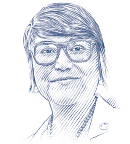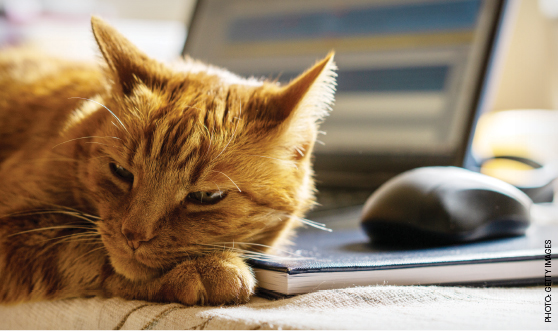
Fumiko Chino, MD
My husband and I adopted our cat, Franklin, on a cold November day. It was one of the last days Andrew felt well enough to leave the house to go anywhere other than to chemotherapy or a doctor’s appointment. Our news at these appointments had shifted toward the negative, with disease progression on scans, low blood cell counts, and fluid accumulating in places it shouldn’t be.
After a year of aggressive treatment, his body was tiring out, and treatment options were becoming limited. Andrew had always wanted a cat, but I was resistant; I knew that I would be taking care of both of them and wasn’t sure I was ready. At a certain point, though, if your dying husband wants a cat … you get a cat, right?
Franklin was a rescue—a scrappy orange boy with stripy legs and a spotted belly. He played with my husband’s oxygen tubing, batting the plastic back and forth. He adapted quickly and would sit in Andrew’s lap in a warm, furry ball, signaling his comfort with loud, full-throated purrs.
He would play fetch with my husband, who often wasn’t strong enough to leave the bed. There was a large bowl of wrapped candy in the living room, and Franklin would bring one to the bed. Andrew would throw it from his propped-up perch in the bed; if the angle was perfect, he could fling it from the bedroom, through the slight zigzag of the hallway, and into the large open living room. Franklin would race off to chase the candy and then trot back to deposit it one more time in Andrew’s lap. They could do this for hours, it seemed, until one of them tired and then they would nap. They both napped a lot.
A Living Presence
After Andrew died in March, it was hard to keep a schedule. Days and nights would drift into each other; it wasn’t until the gray days of late winter before spring showed any promise of life. Franklin was my constant companion and followed me around the house, sitting in the living room to watch a movie or on a kitchen chair to stare at my meals, even into the bathroom. He slept at the foot of the bed and woke me up in the morning to feed him; he made it hard to sleep in all day and forced me to keep at least a semiregular schedule.
I walked everywhere, trying to make simple tasks last all day; walking to get Franklin’s food from the pet store was a triumph of activity. We did, of course, take a lot of naps; sleep was an easy escape from my purposeless existence. He would fit his furry warmth in the crook of my knees or sprawl across my lap, mitigating the cold emptiness of a lonely day. He was a living presence when all I could see around me was death.
From Grieving Widow to Oncologist
Grieving is no simple process, but with time, I was able to return to some semblance of a normal life. I found focus in singular steps: researching school options, studying for the MCAT, interviewing for and ultimately entering medical school. One step at time (one application, one class, one shelf) is how I progressed from grieving widow to oncologist.
“For those struggling alone, I sometimes recommend they consider a trip to the animal rescue.”— Fumiko Chino, MD
Tweet this quote
Franklin would sit on the kitchen table where I worked, putting his paw occasionally on my papers or resting his chin on the warm edge of my laptop. He kept me company through grueling hours of studying and welcomed me home from the hospital at all hours of the night, greeting me with a small noise halfway between a squeak and a meow. Franklin was a welcome constant as I reinvented myself as a physician, a comforting touchstone as I shed my former life as an artist and wife and gained new footing as a clinician and researcher.
I am now in my first year as an attending physician in a world-leading cancer center; Franklin has moved with me to a glorious, light-filled apartment in New York City. Looking back over the decade since Andrew died, I know Franklin was the last gift he gave me. I was so depressed and lonely; I don’t think I could have survived that first dark winter without his presence, much less made it through medical school and residency.
That’s the thing about pets; you care for them, but they also care for you. Franklin provided that extra layer of support that allowed a desperate present to turn into a hopeful future. When I meet with patients and families struggling through treatment now, I try to highlight these simple support goals: physical company, a routine, love, and warmth. We talk about who is available to help and what comfort they can provide. For those struggling alone, I sometimes recommend they consider a trip to the animal rescue. I tell them, they may find they get rescued, too. I know I did.

I moved out of that first house a couple of months after Andrew died. It was too big for just a lady and her cat. When I pushed our bed out from against the wall, I discovered a small pile of candy that had slipped behind his pillow down the back side of the bed. After he was gone, Franklin had continued to bring candy to my husband’s side of the bed, and it had been piling up. I sat down on the floor of our big, empty house and cried big, ugly tears while staring at that stale candy. Then, like a gift, Franklin came over and sat in my lap, a small, warm presence, purring.
Acknowledgment: The author thanks the CancerCare Pet Assistance & Wellness (PAW) Program for providing the impetus to write this piece. At the time this article was published in the Journal of Clinical Oncology, Dr. Chino was working in the Department of Radiation Oncology at Memorial Sloan Kettering Cancer Center, New York.
Disclaimer: This commentary represents the views of the author and may not necessarily reflect the views of ASCO or The ASCO Post.
The ASCO Post is pleased to reproduce installments of “Art of Oncology” as published previously in the Journal of Clinical Oncology. These articles focus on the experience of suffering from cancer or of caring for people diagnosed with cancer. They include narratives, topical essays, historical vignettes, poems, and photographic essays. To read more, visit ascopubs.org.
DISCLOSURE: Dr. Chino reported no conflicts of interest.

